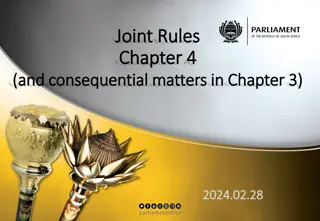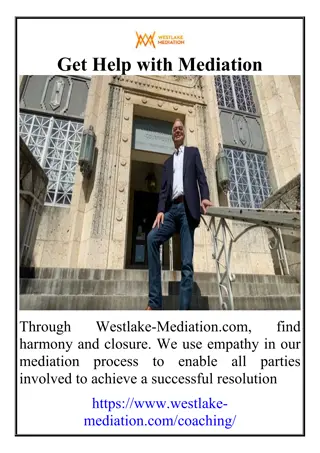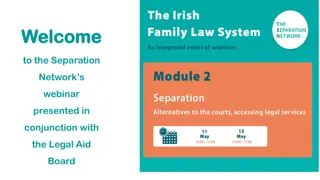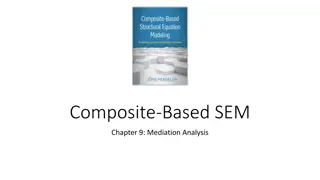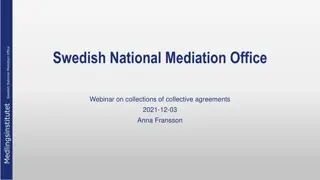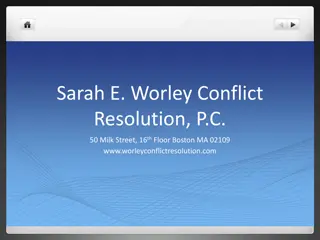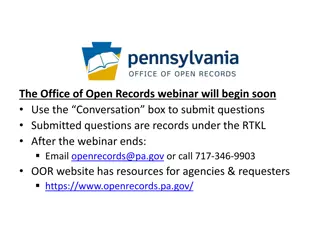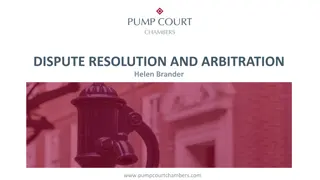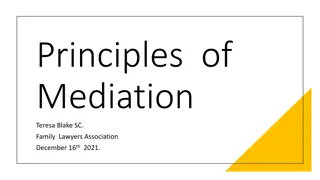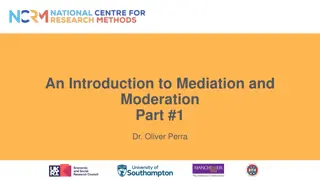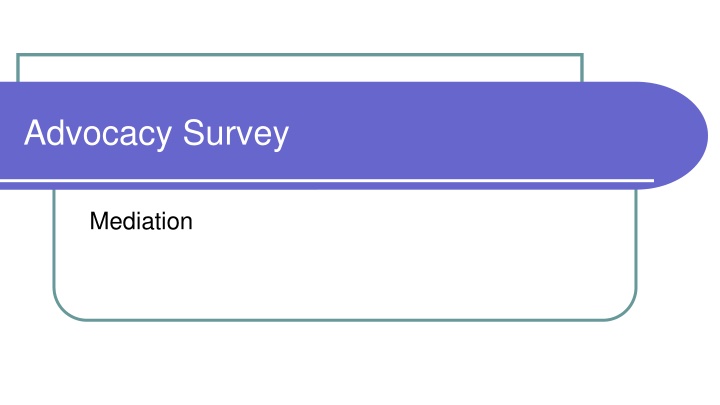
Stages of Mediation: Understanding the Process
Mediation is a process that involves various stages such as the mediator's opening statement, parties' opening statements, joint discussion and problem-solving, private caucuses, and joint negotiation. Each stage plays a significant role in facilitating communication, understanding, and reaching a mutually acceptable settlement between disputing parties.
Download Presentation

Please find below an Image/Link to download the presentation.
The content on the website is provided AS IS for your information and personal use only. It may not be sold, licensed, or shared on other websites without obtaining consent from the author. If you encounter any issues during the download, it is possible that the publisher has removed the file from their server.
You are allowed to download the files provided on this website for personal or commercial use, subject to the condition that they are used lawfully. All files are the property of their respective owners.
The content on the website is provided AS IS for your information and personal use only. It may not be sold, licensed, or shared on other websites without obtaining consent from the author.
E N D
Presentation Transcript
Advocacy Survey Mediation
Mediation: Can It Be A Legitimate Legal Process? The Kansas Supreme Court, in Court Rule 902 (2001) describing mediator qualifications for court referrals and approved programs, stated: "No standards or qualifications should be imposed upon any person chosen and agreed to by the parties. These qualifications should not prevent parties having free choice of process, program and the individual neutral."
Stages of Mediation*: Stage 1 Mediator s Opening Statement After the parties are seated at a table, the mediator introduces everyone, explains the goals and rules of the mediation, and encourages each side to work cooperatively toward a settlement. *Taken from Nolo.com
Stages of Mediation: Stage 2 Parties Opening Statements Each party is invited to describe, in his or her own words, what the dispute is about and how he or she has been affected by it, and to present some general ideas about resolving it. While one person is speaking, the other is not allowed to interrupt.
Stages of Mediation: Stage 3 Joint Discussion & Problem-Solving The mediator may try to get the parties talking directly about what was said in the opening statements. This is the time to determine what issues need to be addressed, what facts the parties actually agree on, and to determine each party s interests.
Stages of Mediation: Stage 4 Private Caucuses The private caucus is a chance for each party to meet privately with the mediator (usually in a nearby room) to discuss the strengths and weaknesses of his or her position (reality testing) and new ideas for settlement. The mediator may caucus with each side just once, or several times, as needed. These private meetings are considered the guts of mediation. (Newhouse: Live in the question )
Stages of Mediation: Stage 5 Joint Negotiation After caucuses, the mediator may bring the parties back together to negotiate directly.
Stages of Mediation: Stage 6 Closure If an agreement has been reached, the mediator may put its main provisions in writing as the parties listen. The mediator may ask each side to sign the written summary of agreement or suggest they take it to lawyers for review. If the parties want to, they can write up and sign a legally binding contract. If no agreement was reached, the mediator will review whatever progress has been made and advise everyone of their options, such as meeting again later, going to arbitration, or going to court.
Marketplace Mediation Model* Referred to and external from the Courts Referrals are sometimes mandatory and sometimes require the consent of the parties. Mediators are usually selected from a list of accredited professional mediators Mediators are paid directly by the parties but public funds are available in limited circumstances. Mediator fees are sometimes regulated. Is favored in common law jurisdictions *From Global Trends in Mediation , Alexander
Justice Mediation Model* At the request of the parties within the court proceedings No additional cost Before a judge who will not be the judge at trial if the mediation does not settle. The parties do not have a choice of the mediator. Is favored in civil law jurisdictions *From Global Trends in Mediation , Alexander

